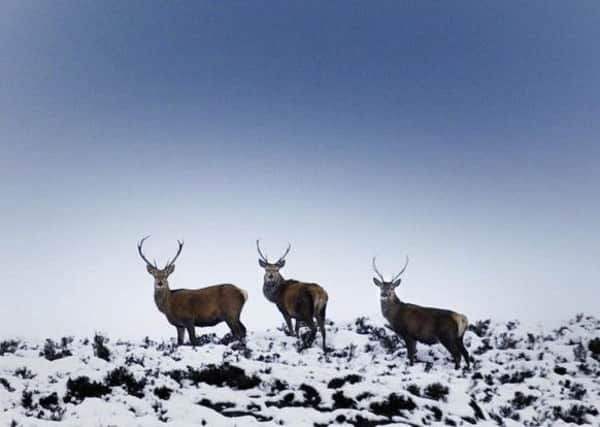Red deer poacher first to be caught by DNA test


Gamekeeper James Kennedy, 69, shot and killed a red deer, removed its internal organs, head and lower legs, before taking it from Glenfinnan Estate in Lochaber in the Highlands.
Police were alerted of suspected poaching activity last February by members of the West Lochaber Deer Management Group and later stopped Kennedy in his van, discovering a deer carcass in the rear.
Advertisement
Hide AdAdvertisement
Hide AdIt had been gralloched, a term describing how parts of the animal had been removed.
Kennedy told officers he had shot the deer lawfully at another location, meaning there was no basis for the police to detain him or seize the deer carcass at that time.
However, two days later, the head of a red deer hind, along with deer stomach and intestines, legs and heart were found on a hilldside at Druim na Brein-choille on the Glenfinnan Estate.
Samples of the deer heart and deer hair were taken to the Science and Advice for Scottish Agriculture (SASA) laboratory in Edinburgh for examination.
A search warrant was later obtained and a blood stain was found on a metal tray in the rear of the van.
The SASA scientists established that there was a DNA profile match between the red deer remains found on the estate and the bloodstain in the accused’s vehicle.
The probability of these DNA profiles matching by chance alone is one in 40 million.
Kennedy last month pled guilty by letter to killing the red deer and gralloching it, an offence under Section 22 of the Deer (Scotland) Act 1996, on 2 February last year.
Advertisement
Hide AdAdvertisement
Hide AdHe appeared at Fort William Sheriff Court on Tuesday for sentencing.
Solicitor advocate Urfan Dar, defending, said his client was well known for his community work in Fort William.
Sheriff Richard Davidson said the appropriate sentence was a “relatively minor penalty” in recognition of the good works Kennedy had done.
He fined the 69-year-old £100 and ordered him to pay compensation of £70.
After the case, Kennedy said: “I’ve been a keeper and I respect deer. I’m all legal and I always shoot in season.”
The Crown Office said this was the first time that DNA profiling has been used to detect deer poaching.
The use of animal DNA as evidence in wildlife crime investigations in Scotland was enabled by the establishment in 2011 of a dedicated Wildlife DNA Forensic (WDF) unit at the Scottish Government’s SASA laboratories.
In addition to handling wildlife crime casework, the unit also looks to develop new tests to meet the needs of investigators, particularly for priority areas such as poaching.
Advertisement
Hide AdAdvertisement
Hide AdSara Shaw, Procurator Fiscal, Wildlife and Environment, said: “This investigation and prosecution was a result of excellent partnership working between SASA, Police Scotland and specialist prosecutors from the Wildlife and Environmental Crime Unit.
“This conviction represents a highly significant step forward in the fight against wildlife crime. Those who flout our wildlife law will be brought to account for their criminal activity.”
FOLLOW US
SCOTSMAN TABLET AND MOBILE APPS
Chief Inspector Colin Gough, Highland and Islands Division Wildlife Crime Co-ordinator, added: “It is a ground-breaking step forward from a policing perspective to be able to employ new scientific developments to allow cases such as this to be solved.
“Very often, poaching goes unreported and investigations can be complex and prolonged so to be able to link the suspect with the crime should hopefully send out a strong message to those who partake in this devastating crime.
“Dr Webster and everyone involved in the development of the deer DNA profiling are to be commended for their hard work and dedication.”
Dr Lucy Webster, of the WDF unit at SASA said poaching was often a crime with no witnesses, but the use of DNA evidence from red deer to link the suspect to the crime provides the investigating officers with the evidence they need to proceed towards prosecution.
She added: “This case clearly demonstrates the benefits of this approach, and also the rewards of partnership working to combat wildlife crime.”
Professor Josephine Pemberton, of the University of Edinburgh said: “I am extremely pleased that our red deer DNA profiling system has been used to enforce a poaching case.
Advertisement
Hide AdAdvertisement
Hide Ad“Our involvement in the forensic validation of this test has given added value to our long term genetic research of Scottish deer populations.”
Dr Helen Senn, WildGenes Laboratory, Royal Zoological Society of Scotland (RZSS). “RZSS is delighted to have been able to support the development of the Scottish Government led red deer DNA forensic profiling system. The ability to enforce against deer poaching and other wildlife crime is crucial for effective land management and conservation within Scotland.”
SEE ALSO